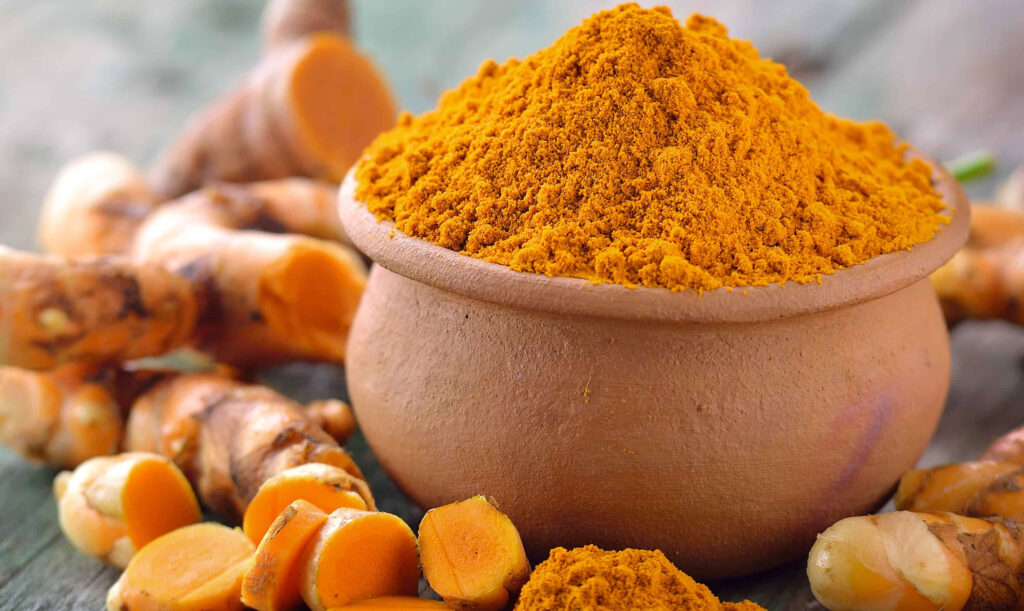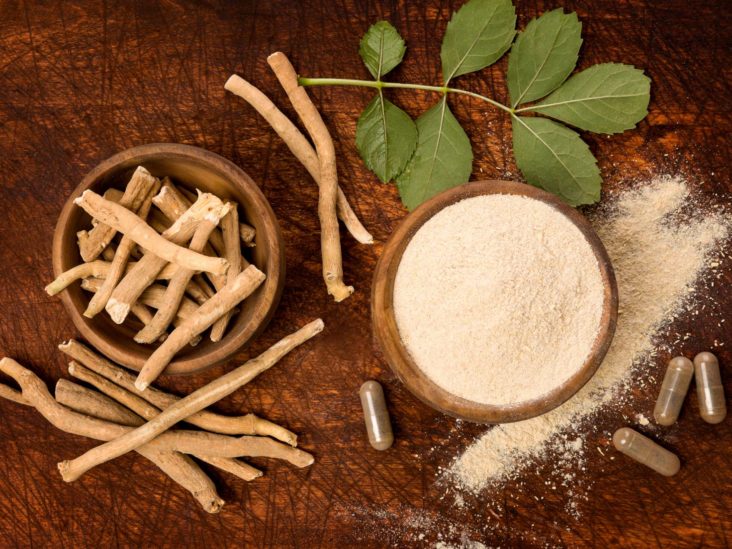Curcuma : l’herbe dorée
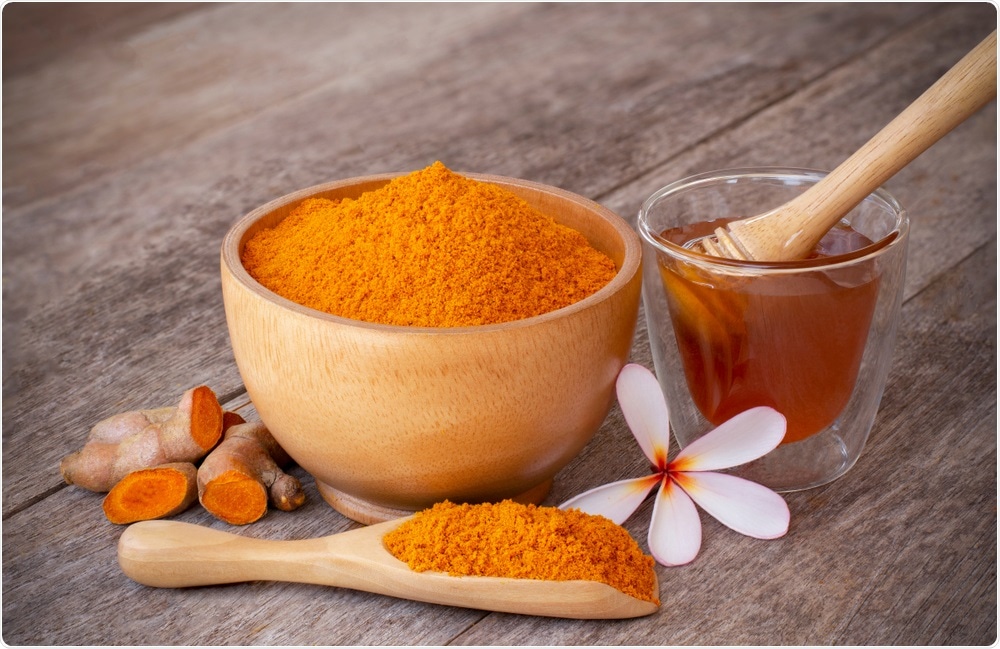
Le curcuma est un aliment de base dans les cuisines indiennes – que ce soit pour aromatiser nos currys ou jeté dans du lait frémissant pour soulager un nez qui coule. Qu’il s’agisse de la fièvre vertigineuse, d’une poussée d’acné ou d’une ecchymose lente à guérir, le curcuma a toujours trouvé sa place dans les remèdes maison de notre grand-mère.
Le curcuma (Curcuma longa) est une plante herbacée vivace de la famille du gingembre. Il est originaire des régions tropicales à fortes précipitations d’Asie du Sud et cultivé principalement en Inde. Le curcuma indien est considéré comme le meilleur au monde pour ses qualités inhérentes et sa biodisponibilité élevée de la curcumine. La poudre de curcuma dorée est obtenue en broyant la tige souterraine de la plante, un rhizome. L’utilisation du curcuma comme ingrédient culinaire remonte à 2000 avant notre ère en Inde védique.
Les propriétés curatives du curcuma en font une herbe étonnante, utilisée dans de nombreuses formulations ayurvédiques. Le curcuma est connu sous le nom de Haridra en sanskrit, ce qui signifie celui qui orne Hari ou Lord Vishnu. Sa couleur jaune éclatante est de bon augure et fait partie intégrante de divers rituels. Il possède de multiples propriétés curatives et possède des propriétés antioxydantes et anti-inflammatoires.
Cette épice jaune vif a été saluée comme un superaliment. La curcumine, l’un des composants actifs les plus importants du curcuma, a fait l’objet de recherches approfondies en raison de ses propriétés anti-inflammatoires. Il améliore l’immunité et aide à maintenir les niveaux de sucre dans le sang. Il aide à une digestion saine et stimule votre humeur.
Curcuma dans l’Ayurveda

Dans l’Ayurveda, le curcuma est classé comme Vayasthapana, ou restaurateur d’âge, et Ojo vardhana, ou booster de vitalité. Il équilibre Vata et Kapha dosha en raison de son ushna ou puissance chaude. Il équilibre Pitta à cause de son amertume. Par conséquent, il équilibre les trois doshas. Il soutient Rasa dhatu (plasma) et Rakta dhatu (sang) en bonne santé et nourrit le système circulatoire en faisant circuler ses bienfaits pour la santé dans tout le corps. Il soutient Agni (métabolisme sain) et maintient ainsi une force digestive optimale.
Propriétés du curcuma

Le curcuma possède de nombreuses propriétés qui en font un ingrédient inestimable dans de nombreuses formulations ayurvédiques. Regardons quelques-unes des propriétés importantes du curcuma:
- Turmeric for pimples: Curcumin, the active principle of turmeric, has potent anti-microbial properties. Since ancient times, it has been a well-known and effective remedy for many skin issues.
- Turmeric for pain relief: Enriched with anti-inflammatory properties, turmeric is effective in joint issues.
- Antioxidant: Turmeric is a rich source of antioxidants, protecting the body from the adverse effects of free radicals.
- Turmeric for Diabetes: Turmeric possesses anti-diabetic properties, helping decrease blood sugar levels and may reduce the effects of diabetes complications.
- Turmeric for weight loss: Turmeric is a metabolism booster that reduces fat tissue growth.
Bienfaits pour la santé du curcuma
Haridra (curcuma longa) ou curcuma est le safran indien et l’épice dorée. Les avantages de Haridra ont été largement discutés dans les textes ayurvédiques classiques. Le fait que Haridra ait 80 synonymes témoigne de ses avantages utilitaires identifiés il y a des milliers d’années.
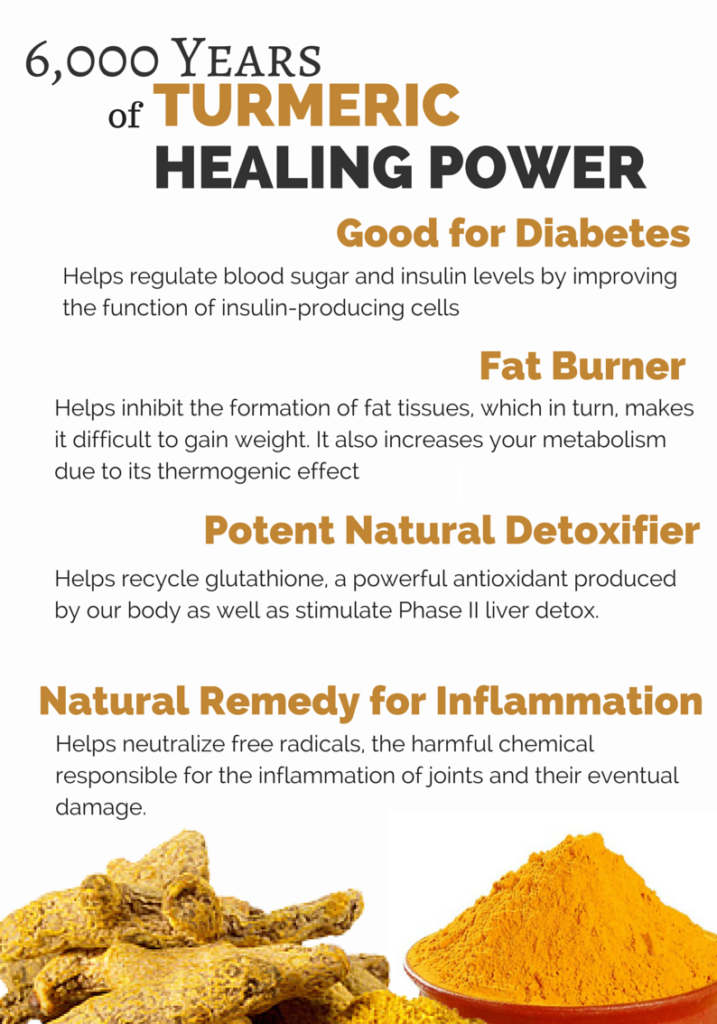
- Turmeric for immunity – Turmeric is known as an immunity booster herb. Curcumin, an active compound found in turmeric, has anti-inflammatory properties that can help fight colds, flu, and other microbial diseases. Turmeric milk, or Haldi doodh has traditionally been a healing remedy for colds and coughs.
- Turmeric for pimples – Turmeric has been linked to beauty therapies because of its skin healing properties. It has over 300 antioxidants that help brighten skin and prevent breakouts. A face pack of sandalwood, turmeric, and milk can effectively remove tan.
- Turmeric for wound healing – Turmeric has antiseptic properties that can promote quick wound healing. Topical application of turmeric over fresh or chronic wounds promotes faster wound healing. It also prevents and cures fungal infections.
- Turmeric for digestion – The antioxidant and anti-inflammatory property of turmeric boosts digestion and soothes the stomach lining. The Katu (pungent) taste escalates the Agni (digestive power) and facilitates the secretion of digestive juice.
- Turmeric for cholesterol – Turmeric improves your blood vessels’ function and keeps cholesterol in check. It helps improve circulation and reduces the triglyceride levels.
- Turmeric for pain relief and joint health– It improves the functioning of joints by easing joint pain and improving flexibility. It can help reduce the inflammation of joints, relieving swelling. Due to curcumin’s presence, turmeric helps relieve joint issues. It is inherently Vata-kapha pacifying in nature and has a soothing effect on the locomotor system. Ayurveda Acharya Vagbhata included turmeric in the Haridradi group, indicated for curing rheumatism. Contemporary studies have confirmed that curcumin, the key ingredient of turmeric, protects soft tissues, including cartilage.
- Turmeric for brain health – Curcumin boosts levels of the brain hormone BDNF. This hormone boosts the growth of new neurons and may help fight various brain degeneration. It is also said to improve memory and concentration and reduce anxiety.
- Turmeric for liver – Turmeric helps in detoxification and helps maintain liver health. Studies have confirmed that it may help heal nonalcoholic fatty liver. It helps reduce oxidative stress and assists in liver regeneration.
- Turmeric for diabetes – Turmeric helps reduce blood sugar and associated complications in type 2 diabetes. It also assists in healthy weight management. It improves fasting blood sugar levels and insulin resistance.
Curcuma remèdes maison
Comme les gens sont bien conscients de nombreux avantages du curcuma, il a été largement utilisé dans les remèdes maison. Regardons une utilisation bien connue du curcuma:
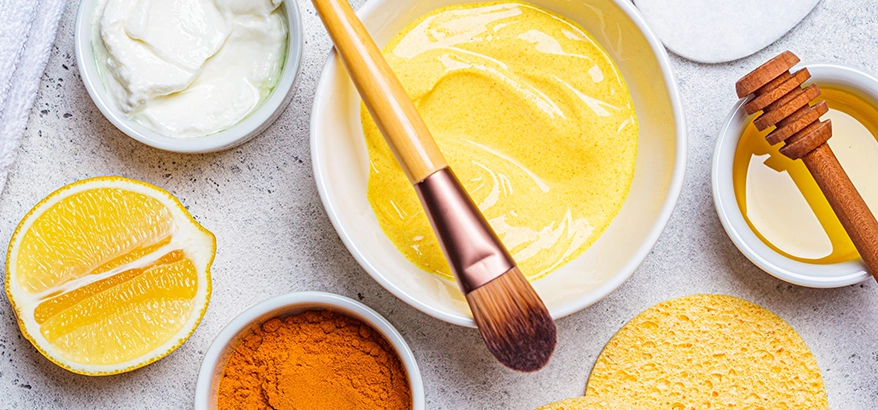
- Turmeric milk is a traditional, soothing drink, often called golden milk, used to soothe a sore throat and other inflammatory conditions. To prepare Turmeric milk, add ¼ teaspoon of turmeric and a pinch of black pepper powder into a glass of warm milk and drink. This turmeric milk is well known for treating colds and coughs. It is also suitable for promoting sleep. Adding pepper helps in better absorption of curcumin.
- Turmeric is used in many face packs. Because of its antimicrobial and healing properties. For oily skin, use of turmeric powder with lemon juice or multani mitti, and for dry skin, use it with milk as a face pack. Apply it for 10-15 minutes and wash with cold water. It helps clear pigmentation, acne, blemishes, and tan.
- For relieving a sore throat, mix one teaspoon honey with ½ teaspoon turmeric powder and consume 2-3 times a day.
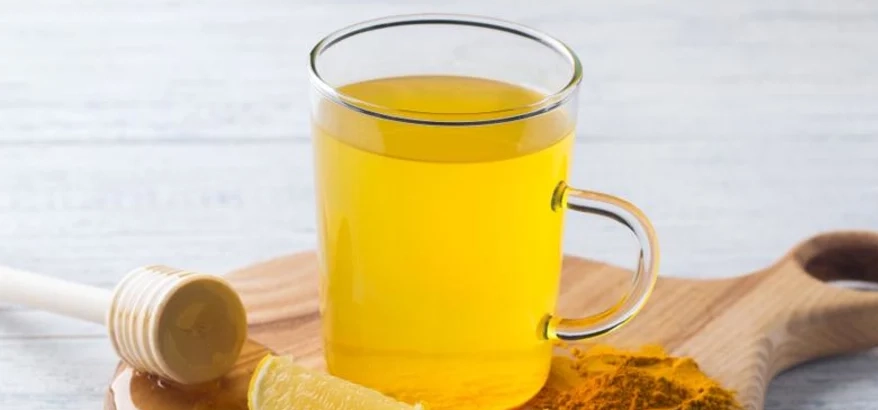
- Turmeric tea is a soothing and warm blend of herbs steeped slowly to detoxify your body. Boil 200 ml of water and add one inch of freshly grated turmeric or ½ teaspoon of turmeric powder. Strain and add one teaspoon of lemon juice and honey as required.
- Mix one tablespoon of amla juice with a pinch of turmeric and consume on an empty stomach to balance your blood sugar levels.
Effets secondaires du curcuma
Le curcuma est sans danger pour la consommation. Les cuisines indiennes utilisaient le curcuma dans les temps anciens. Cependant, il faut connaître les effets secondaires potentiels du curcuma tout en l’utilisant comme supplément ou en le prenant en grande quantité.
- If taken in large quantities, turmeric might cause gastric irritation, diarrhea, or mild discomfort.
- Some commercially available turmeric powders with harmful colorants and fillers, such as rye might be adulterated. These can cause ill effects, so always consume turmeric from reliable sources.
- Turmeric has an anti-coagulant effect, so if you are on blood thinners like warfarin, it may lead to excessive bleeding.
- Turmeric might lead to drug interactions if you are on other medications. If you are on any other medication or have any health issues, it is better to consult your Doctor before taking any turmeric or curcumin supplement.
- Turmeric might stimulate contractions, so any turmeric or curcumin supplement should be avoided by pregnant women.
Principaux points à retenir
- Turmeric is a herb with potent healing properties
- This golden spice has a particular affinity towards blood and promotes detoxification.
- Turmeric has immense health benefits that range from managing diabetes to improving heart health.
- It is essential to consume turmeric or curcumin supplement only from reliable sources to avoid possible side effects of adulterated turmeric.
- Adding a pinch of black pepper can help better to absorb curcumin, the active component of turmeric.
